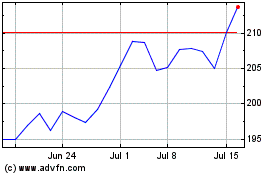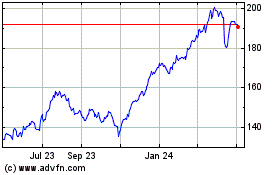Capital, Legg Mason and JPMorgan plan funds without daily
investment disclosure
By Justin Baer
This article is being republished as part of our daily
reproduction of WSJ.com articles that also appeared in the U.S.
print edition of The Wall Street Journal (July 16, 2019).
A new type of exchange-traded fund backed by some of Wall
Street's giants will soon debut.
But there is a catch. Investors will have to be fine with less
transparency.
Capital Group Cos., Legg Mason Inc. and JPMorgan Chase & Co.
are among firms that plan to launch exchange-traded funds that bet
on stocks without disclosing investments each day. The ETFs would
reveal positions quarterly, as mutual funds do, to prevent
front-running of trading ideas. The first of these funds may debut
by year-end.
The structure behind the coming wave belongs to a suburban New
Jersey upstart, Precidian Investments, which received U.S.
regulatory approval for its design in May. Other blueprints, from
other managers, aren't far behind. The bet is that this new model
will help reverse an outflow of client money from traditional stock
pickers.
"This is a game changer for the industry," said Jim Tambone,
chief distribution officer at Alger, an investment firm that is
considering active ETFs and has held talks with Precidian.
The embrace of a less transparent, actively traded stock ETF
represents the latest attempt by more-traditional asset managers to
grapple with a sea change in the industry over the last decade.
Clients are flocking to cheaper, passively managed products tied to
indexes and losing faith in more-expensive managers that try to
outperform the market.
No product better embodies this shift than the ETF, which trades
on exchanges like stocks but is cheaper, more transparent and more
tax-advantageous than mutual funds. There are now more than 2,200
ETFs listed in the U.S., and ETF trading now accounts for roughly
20% of the daily volume in U.S. stock markets each day, according
to Nasdaq.
The search for an ETF that stock pickers could use began more
than a decade ago, as several firms suggested what it would look
like. ETF pioneers Gary Gastineau and Todd Broms first sought
regulatory approval in 2005 for a hybrid fund that offered some of
the same cost and tax benefits that ETFs provide. Eaton Vance Corp.
has since launched funds based on Messrs. Gastineau and Broms's
design. Fidelity Investments first submitted a confidential filing
on the concept with the Securities and Exchange Commission in 2007
and is among firms that are still seeking the agency's
blessing.
Other firms launched actively traded stock ETFs that disclosed
their positions daily as passive ETFs do. But the first to win SEC
approval for a version that would reveal positions less frequently
was Precidian, a firm in Bedminster, N.J., run by four veteran
financial engineers who spent most of their careers outside the
asset-management industry. Legg Mason bought a minority stake in
Precidian in 2016.
"We believe this is a foundational change in the delivery system
for active managers," said Precidian Chief Executive Daniel McCabe.
It will allow the "active manager to compete on a more level
playing field with today's passive ETFs."
Capital Group, Legg Mason and JPMorgan have all agreed to
license the Precidian structure.
An advantage of a less-transparent stock ETF is that it will
free managers to offer stock-picking strategies while keeping
others from front-running their trading ideas.
There are questions, however, beginning with how the new ETFs
will trade and whether they will mimic strategies already used by
existing mutual funds. Some financial advisers need to be convinced
that the new products will benefit their clients and not just help
lift stock-picking managers out of their malaise.
"I'm never going to get very enthusiastic about a product
designed for the sole purpose of asset gathering," said Leo Kelly
III, chief executive at Verdence Capital Advisors, an independent
wealth manager in Hunt Valley, Md.
Mr. McCabe and his team were protégés of the late John Mulheren,
the larger-than-life trader who befriended Bruce Springsteen and
once threatened to kill Ivan Boesky after the speculator testified
against Mr. Mulheren in a 1980s stock-manipulation case.
Mr. Mulheren, who was ultimately exonerated after an appeals
court reversed a conviction, returned to prominence on Wall Street
with Bear Wagner Specialists LLC, a market maker that was partly
owned by Bear Stearns.
Mr. McCabe and Precidian principals Mark Criscitello and Paul
Kuhnle worked for Mr. Mulheren at Bear Wagner when a small
community of Wall Street traders were developing ways to buy and
sell all sorts of investment funds on exchanges, and the team
created some of these funds. Another Precidian principal, J. Stuart
Thomas, previously worked at Morgan Stanley and Merrill Lynch.
As new rules on the stock market's structure upended the
business models of market-making firms such as Bear Wagner, and
Bear Stearns itself began to buckle under the strain of the coming
financial crisis, Mr. McCabe and his partners left to start
Precidian with the backing of the venture capitalist Battery
Ventures.
Precidian filed its first confidential draft application with
the SEC for an actively traded stock ETF in 2009. The firm
ultimately revised the plans for its ActiveShares structure seven
times before the regulator gave its approval earlier this year.
Many of the SEC's questions concerned how the new ETFs would trade
and whether their prices could closely track the value of their
stockholdings.
In July 2015, Eaton Vance made one of Precidian's SEC denials
public when it obtained the firm's communication with the SEC
through a Freedom of Information Act request. Eaton Vance
executives said they publicized the SEC documents to clear up some
confusion over how quickly ETFs powered by Precidian's model would
be available.
Eaton Vance has won agreements with several wealth managers,
including UBS AG, to sell hybrid funds that have some ETF benefits,
but those products have struggled to gain traction with investors.
Eaton Vance is now seeking SEC approval on its own active ETF
model.
Industry executives said Eaton Vance's hybrid idea may have
helped regulators and investors grow more comfortable with the
concept -- and paved the way for Precidian and other ETF
developers.
"The recent progress in the active ETF space is exciting and
important for asset managers and customers alike," said Greg
Friedman, Fidelity's head of ETF management and strategy.
Write to Justin Baer at justin.baer@wsj.com
(END) Dow Jones Newswires
July 16, 2019 02:47 ET (06:47 GMT)
Copyright (c) 2019 Dow Jones & Company, Inc.
JP Morgan Chase (NYSE:JPM)
Historical Stock Chart
From Mar 2024 to Apr 2024

JP Morgan Chase (NYSE:JPM)
Historical Stock Chart
From Apr 2023 to Apr 2024
